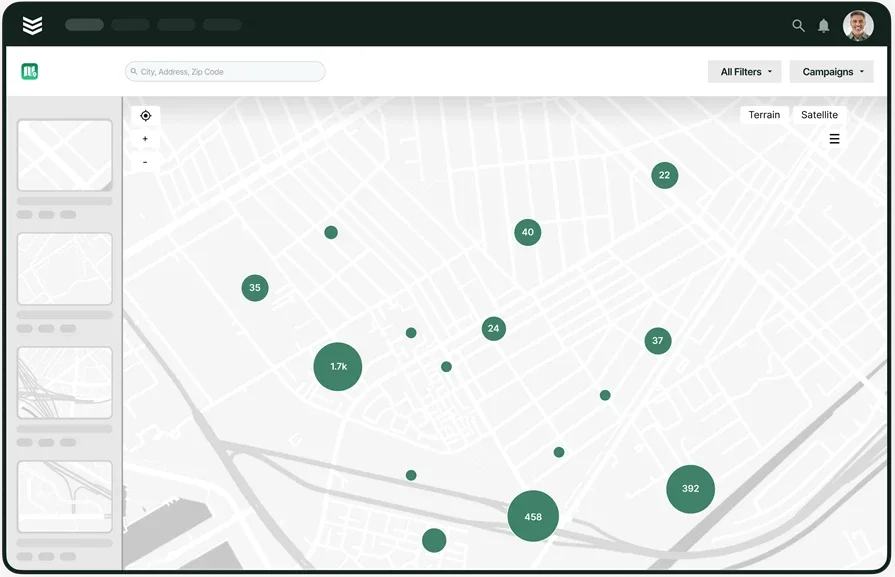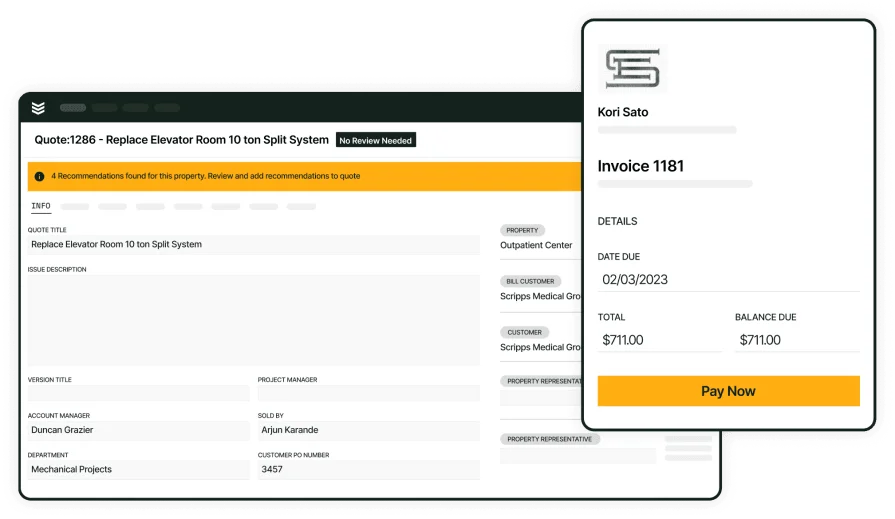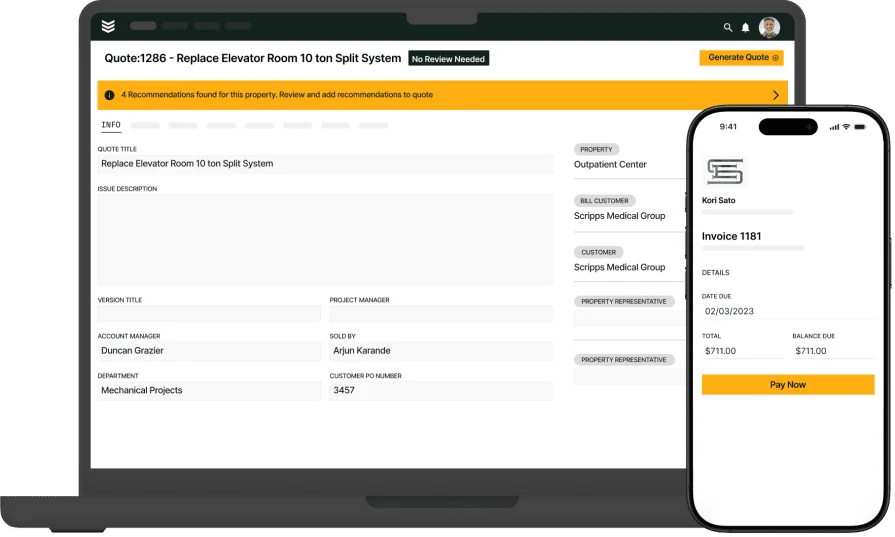Figuring out pricing shouldn’t feel like a guessing game. But for plenty of electrical contractors, it turns into one. Material costs shift daily. Labor rates vary by job type. And trying to keep track of bids across different projects can chew up hours your crew could spend in the field.
That’s where electrical pricing software comes in—giving you a faster, more accurate way to build quotes, control margins, and win jobs. Whether you’re running a small service team or managing multi-site commercial installs, using software that fits how your electrical business operates isn’t a luxury—it’s a necessity. If you work in the electrical industry, choosing the right pricing software keeps your team sharp, protects your profit, and helps you turn quotes into contracts faster. Here’s what we’ll break down:
- Choosing the right electrical pricing software for your needs
- 5 key features to look for in electrical pricing software
- 8 best electrical pricing software for contractors
- 7 benefits of using pricing software as an electrical contractor
- 4 important electrical pricing software FAQs answered
Before diving into the top tools available, let’s zoom out for a second. Not every electrical contractor needs the same setup. Some shops need precise estimating tools for complex installs. Others juggle maintenance contracts and high-volume service work. So how do you figure out what fits? Let’s start by walking through what you should consider before picking any electrical pricing software.
Choosing the right electrical pricing software for your needs
Before you spend a dime on any new platform, step back and take a clear look at how your electrical business works out in the field. Electrical pricing software can handle a lot of headaches—but only if it fits how your techs quote jobs, calculate labor, and track materials. What works for a shop focused on commercial tenant buildouts may fall flat for a contractor handling residential panel upgrades all day. Nail down your needs early, and you’ll avoid sinking time—and cash—into software that slows your crew down.
Here’s what you should be thinking about before committing:
- Workflow fit - Does your team need flat-rate pricing, time-and-material pricing, or both? Are your techs handling small service calls, full-scale installs, or custom design-build projects? How often does your pricing need updates due to material price swings or union labor adjustments?
- Team and access - How many field techs need access to the quoting system on mobile devices? Is the software simple enough for both office staff and electricians on the job site? Can estimators, project managers, and field crews all use the same system without confusion?
- Job scope and frequency - Are most of your projects residential, commercial, or industrial? Do you handle recurring maintenance contracts or mostly one-off installations? How many quotes or bids are your teams generating each week?
- System integration - Does it sync with your dispatch board, scheduling platform, or accounting software? Can it pull supplier pricing directly from electrical supply catalogs? Will you waste time duplicating data if the platforms don’t talk to each other?
- Features - Can your techs build branded, accurate quotes fast while standing on the job site? Does it support live material cost updates and real-time margin tracking? Will it give you reporting tools that help identify which jobs bring in the highest profits?
Once you’re clear on what your business actually needs, it gets easier to sort through which features deliver value—and which ones just fill up space. Next, we’ll break down the five core features that can make or break an electrical pricing software.
5 key features to look for in electrical pricing software
When your electricians are out on the job, pricing work shouldn’t slow them down or leave room for costly errors. But too often, electrical contractors still juggle spreadsheets, sticky notes, or endless phone calls back to the office just to build a quote. That wastes time and eats into margins.
The right electrical pricing software takes those headaches off your plate. It puts accurate, up-to-date pricing right in the hands of your field techs, cuts out miscommunication, and keeps your bids sharp—whether you’re quoting a panel upgrade or troubleshooting a commercial power outage. Here are five essential features every electrical contractor needs to keep jobs moving, quotes accurate, and profits steady:
1. Scheduling and dispatch integration
Electrical service work rarely stays perfectly on schedule. Emergencies pull techs in different directions. Job durations change. And one missed estimate on labor hours can throw off an entire bid. This is why your electrical pricing software must connect directly with your field service scheduling and dispatch software. When pricing software syncs with live crew schedules, it automatically factors in labor rates based on actual job times, availability, or overtime hours.
Say your team is replacing switchgear in a commercial facility. Midway through, a fire alarm panel inspection pulls half your crew off the job unexpectedly, forcing rescheduling into evening hours. Because your pricing platform is tied to dispatch and scheduling, it automatically adjusts labor pricing for after-hours work. That way, your quote reflects real labor costs, not wishful thinking—and your profit margin stays intact.
2. Technician mobile access
Your electricians are quoting work while standing under panels, up in lifts, or troubleshooting on live sites. If they need to call the office for every price check, you’re already losing time—and sometimes, the sale. A strong electrical pricing software gives full technician mobile app access, so techs can pull up pricing catalogs, update material lists, and generate professional quotes right from their device—while still on site.
Let’s say your tech is installing new lighting controls in an office building, and the client asks about adding EV charging stations to the project. Instead of promising to "get back with a quote," your tech opens the app, adds current EV hardware prices, calculates labor, applies markups, and delivers a clean quote on the spot. The customer gets instant numbers. Your team locks in the upsell without slowing the job down.
3. Service agreement automation
Electrical maintenance contracts are a steady revenue stream, but they only work when pricing stays consistent. Your electrical pricing software should automatically apply contracted rates for routine jobs tied to long-term service agreements. This keeps field teams from accidentally quoting the wrong rate while maintaining trust with repeat customers.
For example, your crew gets dispatched to perform annual arc flash testing at a manufacturing plant covered under a maintenance contract. With service agreement automation, the correct discounted rate loads automatically into the quote, no matter which tech builds it. Your client sees consistent pricing, billing stays accurate, and your office doesn’t waste time fixing manual quoting mistakes.
4. Integrated CRM and pipeline visibility
Accurate quotes often depend on knowing your customer history. Integrated CRM and pipeline tools bring job histories, past quotes, open bids, and previous material costs directly into your electrical quoting software. That way, every estimate reflects real customer context—not guesswork.
Say a property manager calls your office about retrofitting old breaker panels you serviced two years ago. Instead of starting from scratch, your estimator instantly pulls up past service records, previous pricing, installed equipment, and open work orders. With everything visible inside the quoting tool, your bid is accurate, competitive, and ready to send before your competitor even gets the call returned.
5. Pricing reports and profitability tracking
You don’t just need to build quotes—you need to see if they’re making money. That’s why electrical contractor pricing software must include reporting tools that track estimated vs. actual costs, labor overruns, and job profitability. Without clear reports, small pricing errors quietly eat away at profits over time.
For instance, after reviewing six months of reports, you realize tenant fit-out projects consistently fall short on conduit installation costs. The reporting shows your labor assumptions were off by two hours per job. With this visibility, you update your pricing templates to reflect actual field conditions, protecting margins on future bids before problems snowball.

Explore our bidding product
Win more bids, land more jobs, and manage projects through to completion.
Other notable features to look for in electrical quoting software
While the core features handle the heavy lifting, there are several other tools that can strengthen how your electrical quoting software works day-to-day. These extra features help cut down on manual tasks, improve visibility across your teams, and make the quoting process even smoother — especially as your operation grows.
- Fleet visibility - When quoting jobs, knowing where your vehicles are and how they’re being used helps tighten scheduling and pricing accuracy. A fleet management system connects vehicle location, availability, and travel time directly to your quoting and dispatching processes. This gives office staff real-time data to better plan routes, schedule multiple jobs efficiently, and minimize unnecessary drive time that affects job costing.
- Integrated payment processing - Getting paid quickly is just as important as quoting accurately. Payment features that fully integrate with your quoting platform allow techs to collect deposits or full payments right on-site. Using payment processing tools, your invoices reflect exactly what was quoted, reducing billing disputes and speeding up cash flow without additional paperwork or back-and-forth.
- Time tracking synchronization - Accurate labor tracking feeds directly into both job costing and pricing updates. With integrated time tracking software, your office can monitor how long techs spend on different types of jobs, flagging patterns that help refine labor estimates inside your pricing templates. The tighter your labor data, the stronger your future bids become.
- AI powered features - AI tools can really help power electrical pricing by leveraging historical data automatically, and cutting down on mistakes. In fact, 80% of contractors we surveyed say it will be essential to keeping up with your competition in the next 3 years.
Even with these extra features adding value, picking the best electrical pricing software still comes down to how well it matches your field operations. Some tools focus on speed, others on customization, and a few try to cover the entire quoting and job management process. Let’s break down eight top options to help you find what fits your electrical business.
8 best electrical pricing software for contractors
Electrical contractors use pricing software differently depending on the work they do. Some teams focus on high-volume residential service calls, while others manage large commercial installations with multi-phase schedules. The best electrical pricing software matches how your team quotes, manages contracts, tracks labor, and closes deals. Below, we’ve broken down eight leading options and highlighted who each one serves best.
1. Best for commercial: BuildOps
BuildOps delivers a complete, end-to-end platform built for commercial electrical contractors. Its electrical pricing software doesn’t operate in isolation—it connects directly with the entire field service operation, from scheduling and dispatch to quoting, invoicing, and reporting. This makes it ideal for electrical contractors managing complex installs, long-term maintenance agreements, and multi-location commercial clients without overwhelming field techs in the process.
How pricing works: BuildOps offers custom pricing based on company size, features, and business needs, with quotes provided after a consultation.
Features beyond pricing: In addition to quoting, BuildOps includes advanced scheduling tools, real-time dispatching, time tracking, asset management, and streamlined office-to-field communication. Field technicians can create estimates, get approvals, and collect payments right from the mobile app. Office teams stay fully aligned with built-in reporting and profitability insights.
What sets it apart for commercial: BuildOps is designed specifically for large-scale electrical operations that need full visibility across crews, jobs, and long-term projects. If you handle commercial maintenance contracts, public sector work, or complex industrial installs, this system keeps pricing accurate while supporting your full field service operation.

Give BuildOps a Try
We help electrical contractors improve cash flow after the work is done.
2. Best for residential: ServiceTitan
Image Source: ServiceTitan
ServiceTitan is a top choice for residential electrical contractors who need quick quoting and flat-rate pricing. It includes tools for real-time job costing, on-site estimates, supplier catalog integrations, and fast quote generation. Its mobile platform helps field techs build quotes while still on-site. However, for smaller contractors or companies without large office support, the platform can feel bloated and may overwhelm teams who don't need the full scope of features.
How pricing works: Subscription pricing based on number of users, features, and business size; contact required for a custom quote.
Features beyond pricing: ServiceTitan adds CRM tools, marketing automation, customer communication workflows, technician tracking, and financing integrations that help residential contractors stay responsive to customers.
What sets it apart for residential: ServiceTitan excels in fast-paced residential jobs where speed, customer experience, and quick approvals drive success. Its quoting process is built to support busy service schedules and same-day repairs.
If you want to see which tool is better for your electrical crew’s pricing needs, see how ServiceTitan and BuildOps stack up side-by-side when it comes to their features.
3. Best for general contractors: Procore
Image Source: Procore
Procore offers a broad construction management platform often used by general contractors who include electrical scopes inside larger projects. It brings centralized access to budgets, contracts, RFIs, submittals, and schedules across multiple trades, making it ideal for multi-trade coordination. However, for electrical contractors who focus strictly on field service work, Procore may be overbuilt and complex compared to specialized electrical solutions.
How pricing works: Procore provides custom pricing based on company size, project volume, and specific needs. Direct contact is required for a quote.
Features beyond pricing: The platform includes financial forecasting, document management, collaboration tools, submittals, and field progress reporting—all designed for managing large multi-trade construction projects.
What sets it apart for general contractors: Procore works well for electrical contractors who regularly partner with GCs or manage electrical scopes as part of broader commercial or industrial builds. It connects scheduling, pricing, and change orders into a single management hub.
4. Best for small to mid-sized businesses: STACK
Image Source: STACK
STACK offers cloud-based takeoff and estimating software designed for electrical contractors who need simple, fast estimating solutions without getting into full-service management. Contractors can quickly create digital takeoffs, store material prices, and generate polished proposals with less data entry. However, since STACK lacks built-in dispatch, time tracking, or service management, businesses may need to pair it with other systems to fully run field service operations.
How pricing works: Subscription pricing starts with a free trial, then moves into tiered monthly plans based on user count and selected features.
Features beyond pricing: STACK provides digital takeoff tools, pre-built electrical assemblies, plan markups, and cloud-based access for teams both in the field and office.
What sets it apart for small to mid-sized businesses: STACK is ideal for growing electrical companies that need fast, accurate estimates without the complexity of larger ERPs. It delivers speed and simplicity for estimating, making it great for smaller contractors focused on bidding efficiently.
5. Best for independent contractors: Joist
Image Source: Joist
Joist serves independent electricians and small shops who need simple quoting, estimating, and invoicing tools without heavy setup or complicated systems. It helps users build professional quotes directly from mobile devices, making it easy for solo contractors managing their own service work. However, Joist doesn’t offer advanced dispatching, CRM integration, or large team management, which limits its scalability for larger teams.
How pricing works: Joist offers a free version with basic quoting and invoicing, while paid tiers unlock advanced features such as QuickBooks integration, digital payments, and custom branding.
Features beyond pricing: Joist includes client management tools, digital signatures, payment collection, and mobile-first workflows for contractors handling service work directly.
What sets it apart for independent contractors: For solo electricians or very small service crews, Joist provides simple quoting, fast invoicing, and an easy-to-use mobile experience that helps close jobs without unnecessary complexity.
6. Best for ease of use: Service Fusion
Image Source: Service Fusion
Service Fusion delivers an easy-to-use system designed for electrical contractors who want quick quoting, simple flat-rate pricing, and basic job management features without heavy training or setup time. Its platform focuses on making everyday quoting and scheduling simple for teams who don’t need complex customizations. However, it may fall short for larger operations that require deeper field service integrations, advanced reporting, or CRM features.
How pricing works: Transparent monthly pricing plans with flat rates based on features, with no per-user fees.
Features beyond pricing: Service Fusion includes call tracking, QuickBooks sync, route optimization, dispatch visibility, and customer messaging features for managing service jobs efficiently.
What sets it apart for ease of use: If your techs need something they can pick up and use without much training, Service Fusion keeps the quoting and service process simple, fast, and intuitive for field staff.
7. Best for design-focused electrical contractors: Field Promax
Image Source: Field Promax
Field Promax supports contractors who manage both service work and custom project design in one platform. It provides quoting, scheduling, customer management, and document organization for teams balancing field installs and back-end design requests. However, for larger teams or commercial contractors, its feature set may feel limited when compared to more advanced field service platforms.
How pricing works: Subscription pricing offers multiple plan tiers based on number of users; custom quotes available for larger teams.
Features beyond pricing: Field Promax includes scheduling dashboards, project templates, service histories, document uploads, and customer databases for managing both design projects and recurring service work.
What sets it apart for design-focused contractors: Electrical shops handling design-build work alongside field service calls will find Field Promax helpful for managing both quoting and design documentation inside one system.
8. Best for specialty contractors: Zuper
Image Source: Zuper
Zuper targets specialty electrical contractors managing high-customization work, recurring maintenance agreements, or complex installations. It integrates with multiple third-party platforms like QuickBooks, Salesforce, and Zendesk to bring pricing, CRM, and customer support workflows together. However, for smaller electrical contractors focused mostly on field service, Zuper may feel feature-heavy and more complex than necessary.
How pricing works: Modular pricing based on feature sets, user count, and business type, with custom quotes offered.
Features beyond pricing: Zuper offers intelligent scheduling, asset tracking, service agreements, customer notifications, technician tracking, and automation tools for recurring jobs.
What sets it apart for specialty contractors: Zuper’s flexibility fits electrical contractors who handle niche jobs, recurring maintenance, or highly specialized commercial and industrial installs that require tight coordination across teams and customer accounts.
7 benefits of using pricing software as an electrical contractor
When pricing software works right for electrical contractors, it doesn’t just speed up quoting—it changes how the entire business runs. From the first service call to the final invoice, the best electrical pricing software helps contractors stay profitable, win more work, and avoid the common mistakes that eat into margins. Here’s what it brings to your operation:
1. Fewer pricing mistakes and callbacks
Manual quoting leaves plenty of room for missed parts, labor miscalculations, and underquoted jobs. Pricing software automatically applies your labor rates, markups, and materials pricing based on real job details, cutting costly errors before they happen. As a result, your customers get cleaner quotes, and your techs avoid those awkward callbacks that drain time and trust.
2. Faster estimates and approvals
With everything built directly into the platform, your team can build and send professional quotes before even leaving the jobsite. This speed helps you close deals while the customer’s still motivated and reduces the back-and-forth that slows approvals. Tools like electrical bidding apps give contractors the ability to generate bids quickly, keeping work moving and giving your sales pipeline a boost.
3. Easier scheduling handoffs between office and field
When pricing connects directly to your schedules, your dispatchers and techs stay on the same page. No more confusion about job scope, materials, or labor time once the work order hits the field. Using an electrical contractor scheduling app ensures everyone knows what was quoted, what was promised, and what needs to get done.
4. Tighter field-to-office communication
Strong pricing platforms help bridge field teams with office staff. When techs update pricing or materials onsite, office teams see changes in real time, keeping invoices, job costing, and customer records in sync. This direct line helps reduce mistakes caused by poor communication. Systems like electrical dispatch software keep these updates flowing across your entire operation.
5. Stronger visibility into profitability
Pricing software doesn’t just handle the quote—it tracks how well your pricing actually performs. You’ll know which job types stay profitable, where labor consistently overruns, and which services might need price adjustments. That level of insight helps you refine bids, avoid bad jobs, and protect your margins.
6. Cleaner invoicing and faster payments
When quoting, scheduling, and work orders are tied into the same system, your invoicing stays consistent with what was quoted. This prevents billing disputes and ensures you’re paid on time. Having electrical work order invoice capabilities built in means invoices reflect exactly what your techs completed—no missing line items or forgotten upsells.
7. Centralized customer history and contract data
Having a full customer record inside your pricing system makes quoting easier on future jobs. You can apply historical pricing, reference prior installs, and quickly honor service contract pricing when quoting repeat work. This helps long-term clients see pricing consistency while saving your team hours of rework. Platforms offering electrical contractor invoicing software often centralize this data so your quoting stays sharp with every customer interaction.
4 important electrical pricing software FAQs answered
Every electrical contracting business operates a little differently, but the questions surrounding pricing software tend to hit the same pain points. What does electrical pricing software actually handle? Is it worth the investment? How do you roll it out without slowing down your crews? This section cuts through the noise—giving electrical contractors and technicians clear answers to help guide decisions when adding pricing software into their daily work.
1. What is electrical pricing software?
Electrical pricing software helps contractors generate accurate estimates, apply both flat-rate and time-and-material pricing, manage labor and material costs, and create invoices. It connects real-time job data with your pricing system so your field techs and estimators can quote confidently and close jobs faster.
Most platforms also support custom templates, service agreement pricing, integration with dispatch and scheduling, and vendor catalog syncing. For techs in the field, it eliminates the need for paper forms or guessing on pricing. For business owners, it brings control, consistency, and full visibility across your quoting and invoicing.
2. How does electrical pricing software work?
Electrical pricing software ties together your estimating, labor, and material data into a single system shared by both the office and field teams. It pulls in real-time information, so your quotes reflect true job costs—not outdated spreadsheets or rough guesses. Here’s how a typical workflow looks:
- Techs build quotes using mobile apps or tablets onsite
- Office staff create and manage base pricing tables
- Labor and material costs are tied to specific job types
- Quotes are generated automatically using saved templates
- Approved estimates flow directly into invoicing
- Vendor pricing and labor rate updates sync across the platform
- Service agreement pricing applies automatically where needed
- Reports track profit margins, win rates, and estimate accuracy
The result is faster, more consistent pricing without the back-and-forth that usually delays jobs.
3. Is the cost of pricing software worth it for electrical contractors?
Yes — for most electrical contractors, the savings in time, revenue, and accuracy easily outweigh the upfront cost. Manual quoting leads to missed labor, underbidding, and hours lost trying to fix errors after the fact. Pricing software eliminates those risks.
You also save money by minimizing callbacks, locking in standardized margins, and helping your techs close work while still onsite. And since most electrical contractor pricing software options scale with your team, you don’t overpay for tools you aren’t ready to use. If your team spends more than 5–10 minutes per quote, or loses jobs due to slow follow-up, pricing software quickly pays for itself.
4. Best practices for implementing electrical pricing software
Rolling out electrical pricing software doesn’t have to stall your operations. The key is to roll it out in phases, get buy-in from your team, and train your techs how to use it properly out in the field. Here’s how to do it right:
- Pick software that matches how your team actually works
- Assign one person to lead the setup and collect team feedback
- Import or build your base pricing templates early
- Connect your software to dispatch, scheduling, and CRM systems
- Test quotes on smaller service calls first
- Train both office staff and field techs using real-world scenarios
- Set clear quoting rules for techs to follow onsite
- Track win rates and estimate accuracy from day one
- Review and adjust templates regularly as pricing changes
- Make pricing part of your daily workflow—not a separate task
When implemented correctly, electrical quoting software becomes part of your daily rhythm. It just works—right alongside your crews in the field.
Accurate pricing is where electrical contractors either stay ahead or lose ground. Whether you're quoting a quick panel replacement or managing a multi-phase commercial install, having electrical pricing software built for your workflow keeps your team moving and your bids sharp. The right platform doesn’t just help with estimating—it connects your field teams, office staff, and billing into one clean system.
For commercial contractors especially, where projects involve multiple techs, service agreements, and job sites, all-in-one platforms like BuildOps offer that full visibility. From scheduling and dispatch to quoting, work orders, and invoicing—it brings every piece of the operation together so your pricing stays accurate at every stage.

See if it fits your crew
We help you price, quote, and manage field service jobs to streamline operations.









